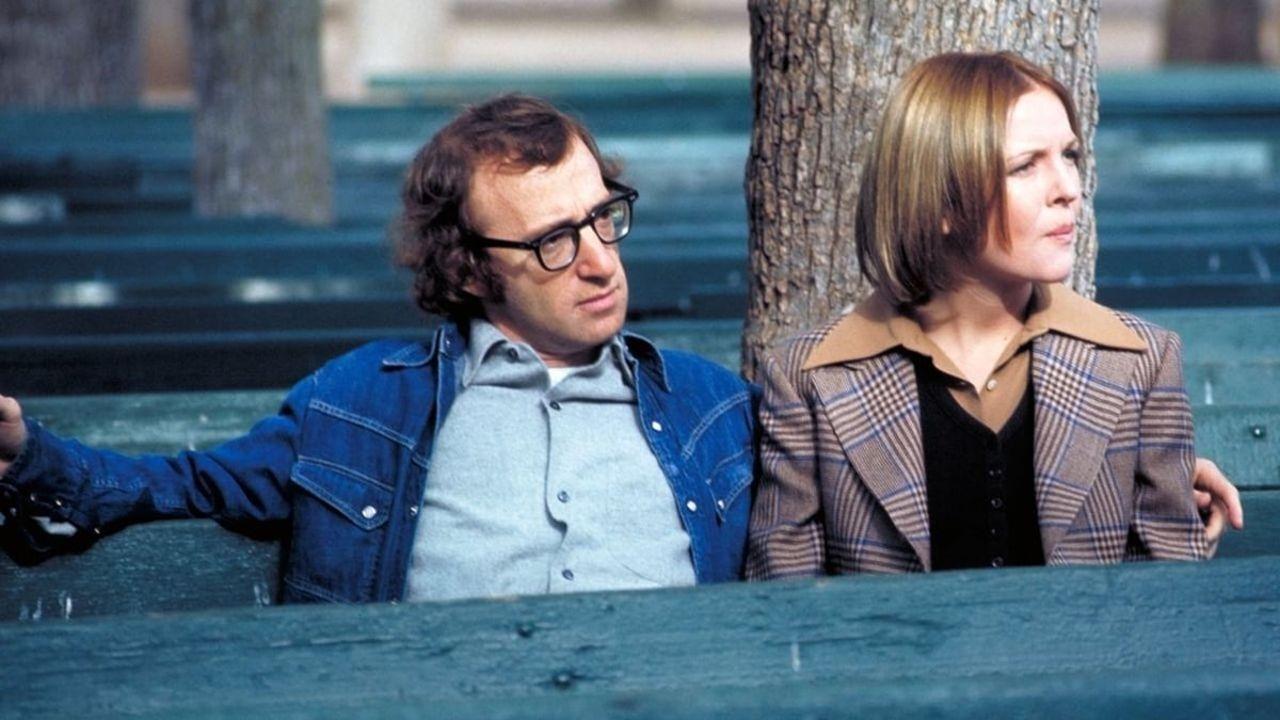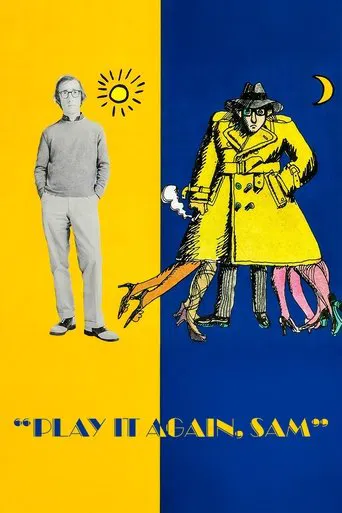

When Allen's wife divorces him, his best friends Dick and Linda, a married couple, attempt to set him up with a new woman. But Dick is busy with work and doesn't pay enough attention to his wife, who spends so much time with Allen they fall in love. Coming nearly two decades earlier, it is perhaps the most Seinfeld-esque film I have seen, and Woody's greatest gift here is the ability to poke fun at himself. He plays a neurotic, anxious, insecure film buff who hilariously makes a fool of himself in front of every new woman he meets, employing both slapstick and one liners. There is also a fantasy element as Humphrey Bogart of Casablanca, a prototype for the alpha male, appears in the background shots as the muse in Allen's imagination, giving him advice on how to approach each situation. Aside from the finale, purposefully mimicking the finale of Casablanca, there is virtually none of that films noir or romantic lighting effects, presenting 'Play It Again, Sam' as a piece of 'reality' to that films stylization. It is fairly light stuff, but a comedians job is to make you laugh, and it certainly does that. Very enjoyable and well crafted.
... View MoreThis is the Woody Allen movie which is always quite easy to overlook. The reason being is that it is the one time where he wrote and starred in a film that he did not also direct. It was based on a Broadway play that he had written and was directed by Herbert Ross. But in all honestly it feels like it could very easily be an Allen directed effort to me and if I didn't know otherwise I would never be able to guess it was anyone else at the helm quite frankly. It stands out a bit when compared to the other films he was directing at the time, all of which were pure comedies with no real focus on realistic situations or even plots but it is very similar indeed to later films such as the classic Annie Hall (1977), which combined broad comedy and physical humour with realistic relationship material that that merged comedy, drama and romance. Quite honestly, no matter who directed this one, it remains one of the best films that Allen has ever been involved in and is successfully hilarious as well as making pertinent observations about male-female relationships.The story centres on a newly divorced neurotic film critic, who has problems with forming new relationships with women. His best friends try to help him meet new ladies but it leads to a series of disastrous dates. The story is straight forward enough but the performances and writing are really what it is all about. Allen is accompanied for the first time by a couple of actors he would work with several times in Tony Roberts and Diane Keaton, who play his best friends; with Roberts so work-obsessed he neglects his wife Keaton who spends increasing amounts of time with Allen, resulting in them having a short affair. All the actors have great chemistry together, with Allen and Keaton in particular working beautifully together.Allen's script is very good with many typically memorable one-liners but it is sometimes the more physical moments that create the biggest laughs, such as the uproarious scene where he is introduced to a new date in his flat and then proceeds to make an absolute clown of himself which had me squirming with laughter. Another aspect which makes this one stand out is the way it pays homage to Casablanca (1942), which Allen's character is obsessed with. Throughout the picture he is visited by an incarnation of Humphrey Bogart, brilliantly played by Jerry Lacy, who offers hilariously unsubtle advice in how to pull women. This mixing of fantasy into a comedy-drama framework is something Allen would return to repeatedly in his later career but its arguable that he never did it so well and funny as he did here. All-in-all, this slightly overlooked movie is truly a great Woody Allen movie, irrespective of whether he was in the director's chair or not!
... View MoreThe Three Acts:The initial tableaux: At the very front of the film is an extended clip from the tail end of Casablanca (1942). If you are aiming to see Play It Again, Sam I would suggest seeing Casablanca first, if you have not already. That parting scene is close to the heart of neurotic movie critic Allan, who lives in San Francisco.The film soon jumps to the reality of Allan's wife leaving him. Allan's involvement with Casablanca spills over into his life as the waking hallucination of Bogart giving him advice for his many problems. No one else sees Bogart, of course.Delineation of conflicts: Allan's arguments with his ex wife are largely over, but she comes back to bite him now and then. Allan tries to re-enter the dating scene with the help of close friend Dick Christie and wife Linda Christie. These attempts run counter to Allan's lack of confidence, urge to impress by fakery, and need to make clever comments over making progress. Bogart's suggestions make sense for Bogart, but not so much for Allan.As the dating failures mount, Allan and Linda have a growing sense of attraction. Linda is married to Dick, and Dick is Allan's best friend, so how can this work?Resolution: The film comes full circle.
... View MoreLike Quentin Tarantino or Martin Scorsese Woody Allen is another director who loves the moves. He loves talking about them and he always has references to a wide range of movies in his movies.Casablanca has often been called one of the greatest scripts to be written and filmed. And it has the fairytale quality that so many films of that time did have. So what better a subject for the Allen in transition between Sleeper and Annie Hall to tackle then retell Casablanca in his own style.In this movie the Woody Allen character is brought out to the full level of his neurosis. He is constantly nervous and fidgety and Allen gives a great performance. There are some really genuine laugh out loud moments.The movie explores many of the themes that would later be explored in Annie Hall and be furthered in Husbands and Wives. It is as all of Allen's films are about relationships. A man who doesn't know what to after his divorce. A couple who are very comfortable with each other and they feel no need for the so called intimate moments in life.Allan tries to become like Bogart. Bogart is actually a character in the film and he constantly tries to advise Allan and the exchanges between them are pure gold. One thing I didn't like was that the guy who played Bogart didn't do a good job and that made it lose the charm. Plus they showed his face and he didn't look like Bogart. Hoever, that might have been intentional to show the character's neurosis.There are constant references to Casablanca and the plot in essence is a retelling of Casablanca and retains much of the plot elements but in distinctly Allen style. He doesn't direct the movie for some reason. Herbert Ross directs and I think Allen would have done a better job. What I have noticed about Allen's films is that he shows love stories without the love scenes and kissing that are not really central to the plot. Herbert Ross feels it necessary and there are a couple of kissing scenes in the movie that seem out of place.Play it Again, Sam stands out as a comedy in its own right. Though it may seem a parody it is not one at all. It brings out Allen's love for Casablanca and showcases his talents as an actor. We see the chemistry that Allen and Keaton share here which would later also be used in Annie Hall. It could have wrong in so many ways but Allen in the 70's could do no wrong. This is another great addition to his filmography.
... View More